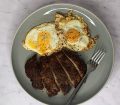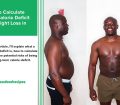Have you ever asked yourself, how much protein should I eat in a day? If yes, you’re not alone.
The topic of daily protein intake has been a constant debate amongst many people and especially gym goers.
In this article I’ll dive deeper into the powerful macronutrient that is protein. And answer all your budding questions along the way.
Firstly, I’ll cover how much protein you should eat per day, benefits of eating protein, how much protein you should eat for muscle gain or weight loss and also whether eating too much protein affects your kidney.
Lets dive in!








Jump to section
How Much Protein Should You Eat Per Day?
Protein intake is one of those topic where it’s appropriate to say, it depends, because daily protein requirement is a science and it is different for everyone.
According to British Nutrition Foundation, you should eat 0.75g per body weight per day if you’re an adult.
This equates to approximately 56g/day and 45g/day for men and women aged 19-50 years respectively.
But, these numbers are incredibly low and are only a general guideline given to the public to avoid people being deficient in protein.
What if you’re a fitness trainer? What if you’re a professional boxer? What if you’re an Olympic swimmer or bodybuilder?
Do you see the dilemma? This is what confuses people about the topic of protein intake.
The truth is, your daily protein intake is not set in stone and shouldn’t be the same for you and I.
So what is the optimal protein intake for you? The question is: optimal for what? For strength training, fat loss or just in general?
To accurately determine how much protein you should eat per day, you have to firstly know what side of the fence you fall on.
If you don’t engage in physical activity or exercise daily, your protein requirements will be drastically different to mine.
I workout regularly and eat 100-120g of high quality protein daily. This amount might seem too high for you but not for me.
I eat a high protein diet because I need to have protein at the ready after my exercise for muscle recovery and throughout the day so I can maintain a positive net protein balance for muscle growth.
How To Calculate How Much Protein You Should Eat Per Day
Ultimately, your protein requirement depends on your age and activity level, especially if you’re a gym goer because protein is a key nutrient you can’t neglect if you want to achieve your fitness goals.
Use this protein calculator to get a rough estimate of how much protein you should eat per day.
Using the calculator above, input your age, gender, sex, height, weight and activity level to get an estimate of your daily protein intake.
Then pick an amount that you can maintain and stick to for the long term. For me, I try to eat 100-120g of protein daily because I can stick to it and it works for me.
Lastly, your daily protein intake will change overtime. Once you weight changes, you should adjust the amount of protein you eat to match your new body weight and fitness goals.
Related Article: Learn the 5 Smart Ways to Build Muscle Fast
What Exactly Is Protein?
Protein is an essential nutrient in the building of muscle mass and contributes to the optimal function of your body.
Protein is the building blocks of your body. It makes up your bones, muscles, organs, hair, skin and nails. Besides water, most of your body is made up of protein.
Protein isn’t a standalone nutrient either. It’s part of a nutrient group called Macronutrients and made up of carbohydrate, fat and protein.
When you exercise, protein is the nutrient responsible for repairing damaged muscle fibers and at the same time initiating muscle growth.
If you live an active lifestyle, it’s important to eat adequate protein to support your training goals. You do that by prioritising eating more high quality protein daily from your diet.





Benefits of Eating a High Protein Diet
Eating more protein will not hurt you. Protein is an important macronutrient and should be a key part of your diet. Eating more protein daily will do more good for your body and should be prioritized regardless of your goals.
Protein is important for many reasons, here are a few:
- Protein is good for your bones.
- Protein increases muscle mass and strength.
- Protein is important for growth, repairs and builds body tissues.
- Protein keeps you satiated and reduces hunger.
- Protein helps you burn fat by increasing your metabolism.



How Much Protein Do You Need To Build Muscle?
When it comes to building muscle you can’t neglect eating adequate protein daily.
Whether it’s on training days or rest days, you have to make sure you eat high quality protein daily with every meal. When you eat more protein with every meal, you’ll be in a positive net protein balance which contributes to muscle growth.
How much protein do you really need to build muscle?
The honest answer is, there’s no one correct answer. As I’ve mentioned in detail at the start of this article, your best bet is using a protein calculator to get an estimate of your daily protein requirement to support your lifestyle and training.



What Protein Food Is The Best To Eat?
Choosing the best protein foods to eat is simple if you stick to eating whole foods that are a source of complete protein.
A complete protein food contains all 9 essential amino acids your body can’t produce on it’s own. By eating complete protein foods you’ll be able to supply your body with the highest quality protein to support your training goals.
Here is an example of foods that are sources of complete protein: Eggs, Quinoa, Milk, Fish, Meat, Pork, Poultry, Chia seeds, Soy, Hemp seeds, and Buckwheat are all foods you can include in your diet daily.
Most of the complete protein foods are mostly animal based. If you’re a vegan, you can combine foods to get a complete protein meal.
For example, eating rice (low in lysine and high in methionine) and beans (low in methionine and high in lysine) will make the meal a complete protein food source even though it’s plant based.
Even if you’re a vegan you have no excuses for not eating more protein.
Which brings me to my next point.. Is there any danger to you if you don’t eat enough protein?
What Happens If You Don’t Eat Enough Protein?
Protein is an essential macronutrient that you need to eat mainly from your diet.
If you don’t eat a high protein diet or you don’t eat enough protein to support your fitness training, your results will lack.
For example, if your goal is to build muscle, eating moderate to high amounts of protein is needed for building muscle mass. Anything lower than 80g of protein daily is too low if you live an active lifestyle.
If you eat less protein while still training to build muscle, it’ll likely lead to muscle loss because you’re not refueling with adequate protein needed to repair and rebuild muscle fibers and body tissues.
Also if your goal is fat loss, the more protein you eat the more satiated you’ll feel throughout the day. This is why I always recommend my clients increase their protein intake while trying to lose weight.
Eating a high protein diet will compliment a weight loss plan and lead to successful weight loss, if you’re in a calorie deficit.
If you continue to eat low amounts of protein it could lead to protein deficiency. Protein deficiency could lead to some serious health problems.
Lastly, if you’re not able to meet your body’s protein requirement overtime, as you get older you’ll increase your risk of developing osteopenia, a precursor of osteoporosis.
Signs of Protein Deficiency
Protein deficiency can manifest in your body in many ways. If you’re a fitness trainer, it’s important to avoid being deficient in protein because the more active you are the more your body readily needs protein to function optimally.
Here’re some signs to look out for to identify protein deficiency:
- Loss of muscle mass: This is one of the most glaring signs of protein deficiency. You can’t afford to lose muscle the older you get because you’ll be at risk of osteopenia and later osteoporosis.
This is why it’s important to make it a priority to not only live an active lifestyle but to eat more protein to support your training and recovery. By exercising daily alongside eating a high protein diet, you’ll be able to build muscle and strengthen your bones.
- Increased risks of bone fractures: Not eating enough protein weakens your bones and may cause them to fracture. By eating a high protein diet alongside doing any form of resistance training, you’ll be able to maintain healthy bones.
- Skin, hair and nail problems: Your skin, hair and nails are made of protein. If you continue to eat a low protein diet, you’ll experience hair problems like hair loss, breakages and split ends.
To avoid any of these problems, it’s important to eat more protein and especially from animal sources. Animal sources of protein provides the highest quality of protein because it’s mostly complete protein that your body can’t produce on it’s own.
- Increased appetite and Calorie intake: Eating a low protein diet will cause you to eat more calories in general which will surely lead to weight gain.
One of the reasons to eat more protein is because it’s the most filling nutrient you can eat. It helps you fill fuller with less food and you’ll be able to keep hunger down and maintain a healthy weight.



How To Increase Your Protein Intake
There’re many ways to increase your daily protein intake.
The best way is to simply eat more protein through your diet. The best sources of protein are whole foods such as ground beef, lean meats, eggs, chicken, fish, soy products, spirulina. You can easily add them to your diet.
You can choose to eat animal sources or plant sources of protein. It doesn’t make a huge difference as long as you eat more protein to meet your daily requirement. Try this Tuna and chickpea salad, it contains 30g of high quality protein per serving.
Alternatively, you can supplement with protein powder to increase your protein intake by drinking protein shakes. If you’re a fan of protein shakes, try this vanilla protein shake for post-workout recovery.
Also, here are some high protein recipes to try:
- Spicy Sweet Potato Fries and Ground Beef
- Tuna and Chickpea Salad
- Vanilla Strawberry Protein Shake
- Egg Fried Rice Meal Prep
Will You Gain Weight If You Eat More Protein?
This is a valid concern and the answer is yes, but it depends on your overall calorie intake.
Your goal should be to eat your daily protein requirement daily within your daily calorie intake each day. By doing this, you” get all the benefits of eating a high protein diet without gaining weight.
Remember, weight gain is a result of being in a calorie surplus on an ongoing basis and it is not dependent on eating more protein or any one macronutrient.
Do You Need Protein Shakes To Build Muscle?
The short answer is no. Because protein shakes are used as a food supplement and can be an effective way to increase your daily protein intake to support your training.
But drinking a protein shake is not necessary to build muscle as long as you get enough protein from your diet. However, it won’t hurt if you drink a protein shake before or after your workout.
Protein shakes are not an essential aspect of eating protein as part of your diet. You should try to get most of your protein from quality food sources such as eggs, meat, chicken, diary, fish, lentil, beans, and many more whole foods.
For specifically muscle building, drinking a protein shake can help supply high quality protein to your muscles after your workout but most importantly, it helps to hit your daily calories.
Only use protein shakes if you want additional protein alongside your healthy high protein diet.
If you insist on using protein shakes, make sure to purchase a high quality protein powder.
Here are some protein shake recipes to try:
- Banana Protein Shake (without protein powder or milk)
Do You Poop More When You Eat More Protein?
Research suggests, eating more protein doesn’t make you poop more other than usual.
The notion that you’re going to poop more after eating protein, especially from meat is a myth and isn’t backed by science. I don’t understand why people think this way in the first place but I have never experienced going to the toilet more than usual because I ate more protein.
What has caused me to poop more is basically when I eat more calories and food throughout the day. If you’re still concerned, pay attention to the protein foods you eat as you slowly increase your protein intake.
For example, if you eat dairy products and it causes you to poop more frequently, then swap it out for another protein food until your body gets used to eating more protein without needing to poop more.
Is Eating Too Much Protein Bad For Your Kidney?
This is one of the oldest myths in the fitness industry and it seriously needs to die.
The research suggests that a high protein diet accelerate kidney damage in people who have kidney disease. If you’re healthy, eating a high protein diet will not affect your kidney.
If you already have a kidney damage, make sure you see your doctor and make sure a nutritionist is also present to help you figure out the ideal protein intake ratio for your situation.
Your High Protein Diet Plan
Are you ready to eat more high quality protein to support your fitness training?
Get my High Protein Meal Plan now. It’ll help you eat more protein to support muscle growth or fat loss. Click on the image below to purchase now.





Conclusion
You can’t go wrong with eating more protein regardless of your goals.
I actually think most people don’t eat nearly enough protein and they don’t even realize it. The more protein you eat, the fuller you’ll get. Hence you’re able to eat less and still feel satiated throughout the day.
No matter what your goal is, make eating a high protein diet a priority.
Read More on Fitness Food Recipes
- Want to create a Calorie Deficit for Weight Loss? Use our Smart Calorie Calculator.
- How To Lose Weight: 3 Proven Methods You Don’t Know About. Find out now.
- Make this Banana Protein Shake if you don’t want to use milk.
- This Spicy Sweet Potato Fries and Ground Beef can help you eat more Protein.








Pingback: Should You Drink Protein Shake Before Or After Workout For Weight Loss? | Fitness Food Recipes